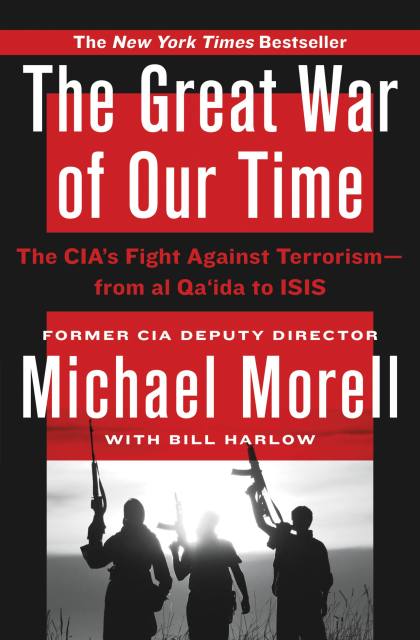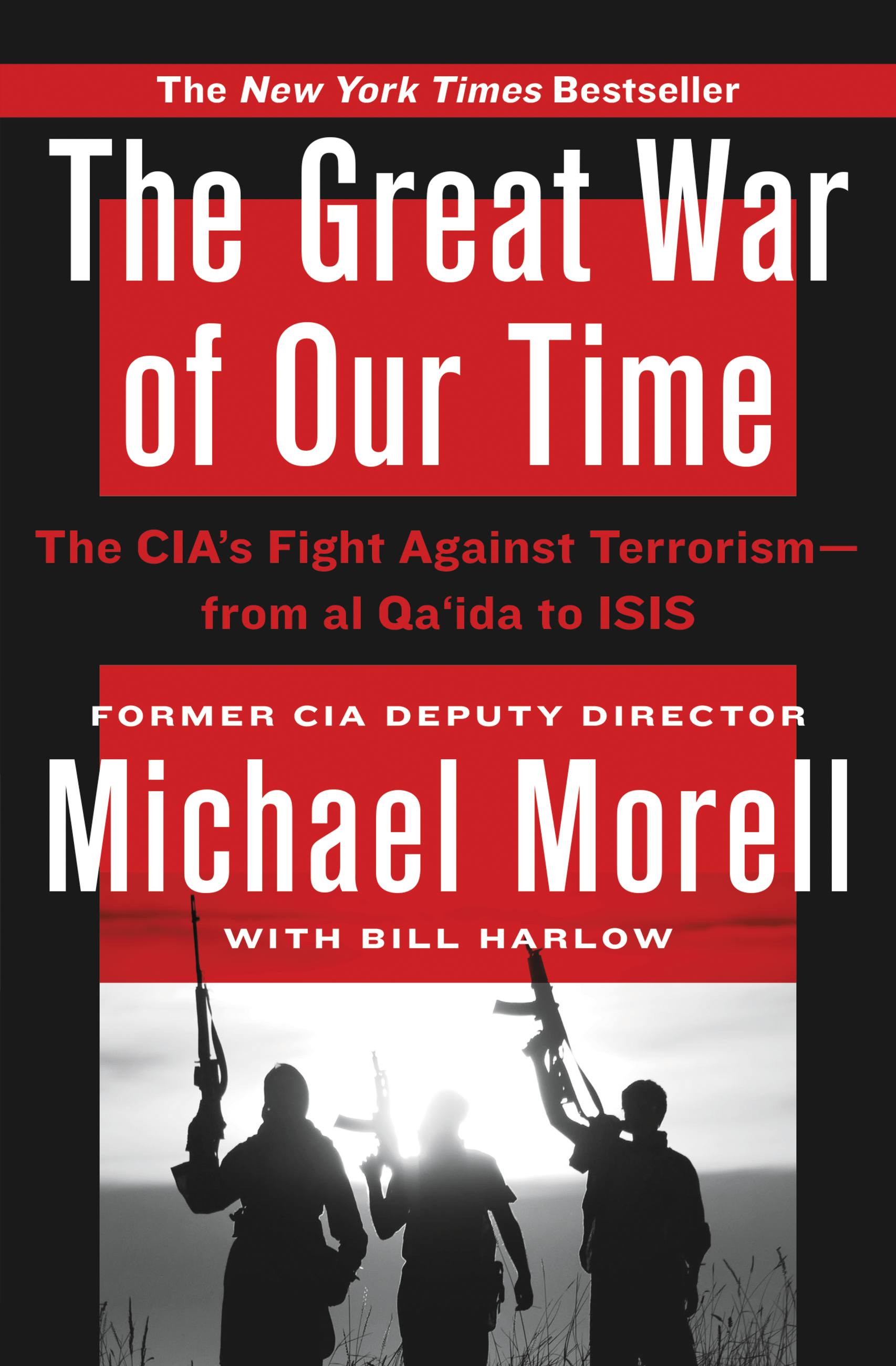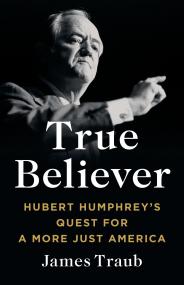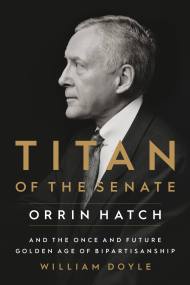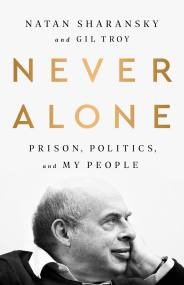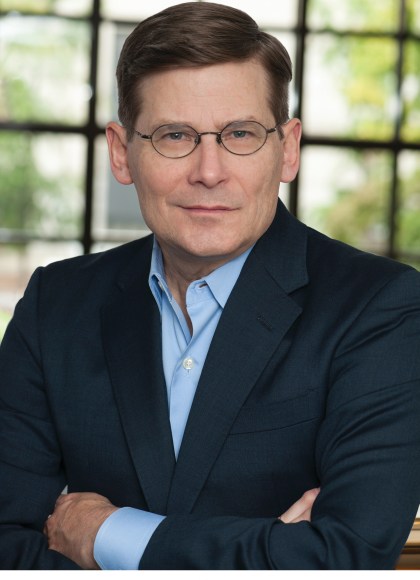Promotion
Use code MOM24 for 20% off site wide + free shipping over $45
The Great War of Our Time
The CIA's Fight Against Terrorism--From al Qa'ida to ISIS
Contributors
With Bill Harlow
Formats and Prices
Price
$9.99Price
$12.99 CADFormat
Format:
This item is a preorder. Your payment method will be charged immediately, and the product is expected to ship on or around May 12, 2015. This date is subject to change due to shipping delays beyond our control.
Also available from:
Like See No Evil and At the Center of the Storm, this is a vivid and gripping account of the Central Intelligence Agency, a life of secrets, and a war in the shadows.
Called the “Bob Gates of his generation” by Politico, Michael Morell was a top CIA officer who played a critical role in the most important counterterrorism events of the past two decades. Morell was by President Bush’s side on 9/11/01 when terrorists struck America and in the White House Situation Room advising President Obama on 5/1/11 when America struck back-killing Usama bin Ladin. From the subway bombings in London to the terrorist attacks in Benghazi, Morell always seemed to find himself on the cusp of history.
A superb intelligence analyst and briefer, Morell now presents The Great War of Our Time, where he uses his talents to offer an unblinking and insightful assessment of CIA’s counterterrorism successes and failures of the past twenty years and, perhaps most important, shows readers that the threat of terrorism did not die with Bin Ladin in Abbottabad. Morell illuminates new, growing threats from terrorist groups that, if unaddressed, could leave the country vulnerable to attacks that would dwarf 9/11 in magnitude.
He writes of secret, back-channel negotiations he conducted with foreign spymasters and regime leaders in a desperate attempt to secure a peaceful outcome to unrest launched during the “Arab Spring.” Morell describes how efforts to throw off the shackles of oppression have too often resulted in broken nation states unable or unwilling to join the fight against terrorism.
Along the way Morell provides intimate portraits of the leadership styles of figures ranging from Presidents Bush and Obama, CIA directors Tenet, Goss, Hayden, Petraeus, Panetta, and Brennan, and a host of others.
Called the “Bob Gates of his generation” by Politico, Michael Morell was a top CIA officer who played a critical role in the most important counterterrorism events of the past two decades. Morell was by President Bush’s side on 9/11/01 when terrorists struck America and in the White House Situation Room advising President Obama on 5/1/11 when America struck back-killing Usama bin Ladin. From the subway bombings in London to the terrorist attacks in Benghazi, Morell always seemed to find himself on the cusp of history.
A superb intelligence analyst and briefer, Morell now presents The Great War of Our Time, where he uses his talents to offer an unblinking and insightful assessment of CIA’s counterterrorism successes and failures of the past twenty years and, perhaps most important, shows readers that the threat of terrorism did not die with Bin Ladin in Abbottabad. Morell illuminates new, growing threats from terrorist groups that, if unaddressed, could leave the country vulnerable to attacks that would dwarf 9/11 in magnitude.
He writes of secret, back-channel negotiations he conducted with foreign spymasters and regime leaders in a desperate attempt to secure a peaceful outcome to unrest launched during the “Arab Spring.” Morell describes how efforts to throw off the shackles of oppression have too often resulted in broken nation states unable or unwilling to join the fight against terrorism.
Along the way Morell provides intimate portraits of the leadership styles of figures ranging from Presidents Bush and Obama, CIA directors Tenet, Goss, Hayden, Petraeus, Panetta, and Brennan, and a host of others.
Genre:
-
"A remarkable narrative about the greatest national security threat America has faced since the Cold War and how the country's premier intelligence agency dealt with it. In THE GREAT WAR OF OUR TIME Michael Morell provides an astute look at key battles won and lost in the fight against al Qa'ida, and he offers invaluable insights for both intelligence and policy into battles yet to come. Anyone who wants to know how the CIA dealt with the al Qa'ida menace and how the country should address it going forward should read this book."Robert Gates, former secretary of defense and CIA director
-
"Intelligence professionals are an unsung but absolutely critical part of our country's national security, and Michael Morell, who served 33 years at CIA, was one of the best intelligence officers our nation has ever had. His service at the senior ranks of CIA coincided with the Agency's fight against al Qa'ida, and in the THE GREAT WAR OF OUR TIME he recounts this history with honesty, insight, and poignancy. This is a very readable book in which you will learn a lot of things you didn't know before-including what it's like to work as an intelligence professional."Joseph Lieberman, former US Senator
-
"Must-read for anyone thinking seriously about terrorism. An authoritative, insightful insider's account of the CIA's leadership in the War on Terror. Courageously ducks none of the thorny issues, from torture and Snowden to Usama bin Ladin."Graham Allison, former dean, Kennedy School of Government, Harvard University, and author of Essence of Decision
-
"Michael Morell has written a compelling narrative about the fight against al Qa'ida and the terror it inspires and exports globally. He provides rare and thoughtful insight into the mystifying world of intelligence, to include the remarkable and patriotic Americans who serve there. Michael is the 'best of the best' and portrays the CIA at a sustained level of excellence during remarkably tough times."Mike Mullen, ADM, USN (ret.), former chairman, US Joint Chiefs of Staff
- On Sale
- May 12, 2015
- Page Count
- 352 pages
- Publisher
- Twelve
- ISBN-13
- 9781455585687
Newsletter Signup
By clicking ‘Sign Up,’ I acknowledge that I have read and agree to Hachette Book Group’s Privacy Policy and Terms of Use
